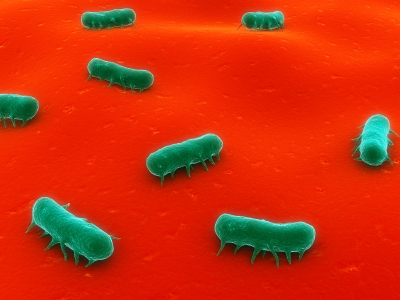Home > Practice Areas > Foodborne Illness > Are You a Victim of Food Poisoning? > Salmonella
Salmonella
 Salmonella, or salmonellosis , is the most common foodborne illness in the United States. The salmonella germ is actually a group of bacteria that can cause diarrheal illness in humans. They are microscopic living creatures that pass from the feces of people or animals, including birds. Salmonella bacteria are usually transmitted to humans by eating foods contaminated with animal feces. That food usually looks and smells normal. Salmonella occurs in raw poultry, eggs, beef, and sometimes unwashed fruit and vegetables. Salmonella may occur in small, contained outbreaks in the general population or in large outbreaks in the general population or in large outbreaks in hospitals, restaurants, or institutions housing children or the elderly.
Salmonella, or salmonellosis , is the most common foodborne illness in the United States. The salmonella germ is actually a group of bacteria that can cause diarrheal illness in humans. They are microscopic living creatures that pass from the feces of people or animals, including birds. Salmonella bacteria are usually transmitted to humans by eating foods contaminated with animal feces. That food usually looks and smells normal. Salmonella occurs in raw poultry, eggs, beef, and sometimes unwashed fruit and vegetables. Salmonella may occur in small, contained outbreaks in the general population or in large outbreaks in the general population or in large outbreaks in hospitals, restaurants, or institutions housing children or the elderly.
The Center for Disease Control and Prevention (CDC) receives reports of approximately 40,000 cases of salmonellosis in the United States each year. Hundreds of thousands more go unreported each year.
Symptoms of salmonellosis include fever, diarrhea, abdominal cramps and headaches. Symptoms typically last four to seven days. Salmonella is typically more serious in the elderly, and in people with chronic conditions, such as AIDS. If salmonella gets into the blood stream, it can be serious and even life threatening. The onset of symptoms of salmonella poisoning is typically 12 to 72 hours after infection. Persons with diarrhea caused by Salmonella typically recover completely, although it may be several months before bowel habits return to completely normal. A small number of people develop Reiter’s Syndrome which is a pain in the joints, irritation of the eyes and painful urination. Reiter’s Syndrome can then lead to chronic arthritis which is difficult to treat.
Determining that salmonella is the cause of a particular illness depends on laboratory tests, typically stool samples of an infected person.
 Salmonella, or salmonellosis , is the most common foodborne illness in the United States. The salmonella germ is actually a group of bacteria that can cause diarrheal illness in humans. They are microscopic living creatures that pass from the feces of people or animals, including birds. Salmonella bacteria are usually transmitted to humans by eating foods contaminated with animal feces. That food usually looks and smells normal. Salmonella occurs in raw poultry, eggs, beef, and sometimes unwashed fruit and vegetables. Salmonella may occur in small, contained outbreaks in the general population or in large outbreaks in the general population or in large outbreaks in hospitals, restaurants, or institutions housing children or the elderly.
Salmonella, or salmonellosis , is the most common foodborne illness in the United States. The salmonella germ is actually a group of bacteria that can cause diarrheal illness in humans. They are microscopic living creatures that pass from the feces of people or animals, including birds. Salmonella bacteria are usually transmitted to humans by eating foods contaminated with animal feces. That food usually looks and smells normal. Salmonella occurs in raw poultry, eggs, beef, and sometimes unwashed fruit and vegetables. Salmonella may occur in small, contained outbreaks in the general population or in large outbreaks in the general population or in large outbreaks in hospitals, restaurants, or institutions housing children or the elderly.